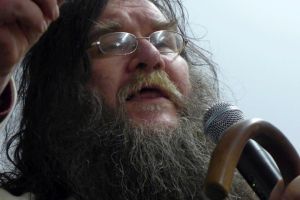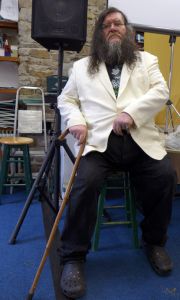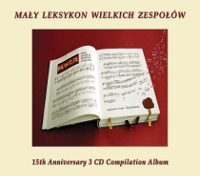Interviewing Jon was always going to be a long, strange and crazy trip, but hopefully I have managed to capture a small fraction of what makes him an incredible person. We have known each other for some five years now, and with the release of his latest album I wanted to discover just a little bit more about his fascinating life. The idea was to tie the conversation back to the new album, ‘Coldharbour’ (https://jondownes1.bandcamp.com/releases) but somehow that never happened, so just take it as read that it is a fine album indeed. Also, if you are intrigued, then there are multiple links at the end of the interview, and if you don’t already get the fine weekly FREE digital magazine Gonzo, why on earth not?
Kevin Rowland: How did you first become involved in Cryptozoology?
Jon Downes: It’s actually a long, and mildly amusing, story. Back in the 60’s I lived in Hong Kong with my family, and every Thursday my mother would go into town to a venerable institution called the Ladies Recreation Club [LRC], where she would play tennis, have coffee with her friends, and from which she would sally forth and go to the main Hong Kong Central Library, from which she would depart with thrillers for my father, Regency Romances for herself, picture books for my little brother and animal books for me.
One day, almost exactly fifty years ago, she brought back a book called Myth or Monster?, which was basically a kid’s version of Bernard Heuvelmen’s seminal On The Track of Unknown Animals. (Bizarrely, even though these days I have a relatively huge cryptozoological library, I have never been able to find this book again.) Reading it was one of the great epiphanies of my life. Together with hearing Led Zeppelin for the first time, and discovering that girls were different to boys. The idea that there were people who believed in such things as Bigfoot or the Loch Ness Monster, and that perfectly reputable scientists were prepared to stake their reputations on something as bizarre as the putative existence of a bipedal reptile called the Tatzelwurm in various parts of the Alps, totally blew me away.
The next day, I went to school and my form teacher, a fearsome woman from Londonderry called Mrs Alexander, did one of the exercises which I guess primary school teachers have been doing since the year dot; she asked the assembled children what they wanted to be when they grew up. Depressingly, most of the girls wanted to be housewives, whilst the boys foresaw at least a partial period in the armed forces, which - as National Service had only ended a few years before - would seem to be a logical answer. I, however, had something else that I wanted to say.
“I’m going to be a Monster Hunter, Mrs Alexander”, I said, politely, not really expecting the shitstorm of wrath which was just about to fall upon my nine-year-old head.
I was the stupidest and most irritating boy in the class, I was told. And by making such an absurd statement, I was only confirming this. And, if I wasn’t going to learn my nine times table, I was never going to amount to anything.
Well, Mrs Alexander. I still don’t know my nine times table. But I have been a professional cryptozoologist now for the best part of thirty years.
KR: How did CFZ come about, and what do you believe is the most important objective achieved by that organisation?
JD: In 1990, I became redundant, which is a polite way of saying that my employers in Exeter Health Authority had finally managed to get rid of me, as I was offered retirement - on the grounds of my mental health - as a slightly more amenable option to getting sacked for ‘Gross Professional Misconduct’ (meaning that, in their minds, I needed a haircut and shouldn’t say the word ‘fuck’ as often as I did).
So, I became a professional writer; writing, apart from playing the guitar, being the only thing I’m any good at. But what was I to write about? I started to write articles about mystery animals and animal mysteries, but soon realised that as a freelancer with minimal credibility, nobody was going to buy my work.
A few years later, in 1992, I was sitting on the shores of Loch Ness with my first wife and a family friend, called “Dave”. I think it was Dave who suggested that, not only did the world need a reputable cryptozoological organization, but if I was to start one, it would give me the credibility that I needed with the British media. So, that’s exactly what I did. I never expected it to get as large, as complicated or as important as it actually has done. But, it has, and I just have to learn to live with it.
There are several important achievements. I like to think that we have done quite a lot to bring cryptozoology into the mainstream, although just a brief look at the British tabloid newspapers will reveal that they are still fond of printing the most appalling nonsense about British Bigfoot, and other things that go bump in the night. So, perhaps, we have not done our job as thoroughly there as we would have liked.
Another, and quite possibly the most important, thing we do is to enthuse young people about nature. As a society, we’ve become increasingly divorced from the natural world over the past few decades, and we believe that cryptozoology is a perfect gateway for young people to find their way into an interest about the wider importance of the natural world.
KR: How do you segment and prioritise your life with so many competing aspects from music to publishing, CFZ, family and others?
JD: I have absolutely no idea. Those people who think that I have some grand master plan are sadly mistaken. I just play it by ear and make it up as I go along.
KR: What inspires you to create music?
JD: I have music in my head continually throughout my waking hours, and – I suspect – in my dreams. I also have the tendency to think in rhyming couplets, a bit like the captions to the old Rupert Bear comic strips. Putting these two things together is just a simple extrapolation of those two things.
I suffer from peripheral neuralgia, which makes my fine motor skills far harder work than they were earlier on in my life. These aforementioned fine motor skills sadly include playing the piano or playing the guitar, and as I have never got around to learning how to read music properly, this would have seemed to mean that my career as a composer was over. But I have learned to make music on computers, and although I play a little bit of guitar still on my records, the vast majority is composed using an invaluable Digital Workstation called FL Studio. And so, for the first time in my life, I am getting closer to replicating the music I hear in my head; something I just couldn’t do with conventional rock and roll instruments. I am not there yet, but I’m working on it.
KR: How would you describe your albums to people who have yet to hear any of them?
JD: This is the question I have been asked many times in the last forty years, and it is one that I have no idea how to answer. I have always admired bands like The Beatles, who released albums with such a wide range of styles included therein that one can imagine a contemporary marketing department pulling their hair out in horror. The same album included a children’s song, like Yellow Submarine, a quasi-religious song based on the Tibetan Book of the Dead, a song featuring a spring octet about a lonely old spinster, and an account of John Lennon’s LSD trip with actor Peter Fonda.
I would not presume to compare myself to The Beatles, but I have also always tried to have a range of different influences in my music. I am basically a singer/songwriter, who can often be accused of not taking his subjects as seriously as he should, as I have a distressing tendency to try to make people laugh. Musically, I take bits of rock, folk, hip hop and country, together with a fair amount of prog rock and a lot of old fashioned rock and roll. But what genre do I think that my music inhabits? Fuck knows.
KR: If you could be any music performer from any era, who would you be, and why?
JD: This is a very difficult one, but the answer is Jimmy Page around about the time of the second Led Zeppelin album; the world was his oyster, but he had the sheer cojones not to play it safe. I wish I was able to exhibit such bravado, and had the financial resources to back it up.
KR: In praise of redundant formats - CDs, magazines, print media, volunteerism - your ideas?
JD: I know that I am supposed to say how much I preferred music to be presented on vinyl. It is – after all – supposed to be a far more superior format for listening to music. But I am old, tired, lazy, and actually really enjoy the luxury of being able to stream music on my television by using Spotify. We are very much in the early days of streaming media, and whilst it is being accused by many people as being the final nail in the coffin of the music industry, it is nothing of the sort. It is purely another one of the regular blips, which have taken place every twenty or thirty years, since the music industry first started in the second half of the nineteenth century. Somehow, the streaming services and the artists will reach an accord. Whether this leaves room for the conventional music industry, remains to be seen.
As far as other media, I much prefer being able to read magazines and books on my iPad. ‘Special’ books, which are meant to be treasured, should indeed be kept as conventional hard copies. But I feel that the vast majority of books, which somebody used to buy in order to read on the train and leave there when they have finished, has now been replaced by eBooks. And, as the paper in each book, which is so blithely thrown away, means the partial death of a tree, then I think it is not necessarily a bad thing.
KR: Your father, the explorer and Colonial Service Officer J. T. Downes wrote several books on a wide range of subjects, such as African history, theology and the Devonshire dialect while your mother Mary Downes was a broadcaster and author who published several collections of Nigerian folklore. In addition, you were raised in Nigeria and Hong Kong, as well as now living in the very deepest part of Devon, so how have these experiences and upbringing shaped your life and future?
JD: I was brought up in a world that no longer exists to fulfil a social role which has vanished for good. If my parents had been able to predict the career arc that I would follow, they would have probably expected that by middle age I would be the Governor of some tiny British Colony, with the power of life and death over my subjects, who would intermittently rise up against me, brandishing spears. But there are no colonies. The world I was groomed to inhabit probably never really existed; my parents had been out of England for so long by the time we returned home in 1971, that they had no idea to approach the complexities of the brave new world in which they found themselves. So, they shut themselves out, something which I have done myself on many occasions. And when their eldest son grew his hair long and started to play and sing rock and roll music, they were not best pleased. My relationship with my parents was not an easy one and resulted in the serious mental health problems that I have to this day. It also gave me a skewed enough outlook on the universe to allow me to be an artist of sorts.
KR: If you were to describe yourself would it be as a hippie, publisher, author, editor, musician, husband, scientist or something else? And why?
JD: Yes, because I am all of these things. You forgot to add novelist, poet, borderline alcoholic, stepfather, grandfather, and a dozen other things. I am polymorphous but not necessarily perverse.
KR: You have just released an album, your latest book is also just published, and while you continue to work on CFZ, Gonzo and others, what will be your next personal project?
JD: Well, I have just released a standalone single, which is dedicated to my granddaughter, Evelyn. A few weeks ago I heard the terrible news from the United Nations that, if we do not take drastic action within the next twelve years, the planet is basically euchred. I have been following with interest the activities of a whole generation of radical young women across the world, who are spearheading ecological direct action in a last ditch attempt to force the governments of the world to do something before it gets too late. Then I realised that, in twelve years times, my granddaughter will be the same age as these young women are now, and the song basically wrote itself from there. You can stream Evelyn’s Song on: https://youtu.be/RiV_C8VYMKE
At the moment, I’m working on a lengthy book about my childhood in Hong Kong, and the animals that I lived alongside. After that, I have at least three non-fiction books mapped out, and the next book in the series of novels which began with The Song of Panne.
So, I am a busy little sod!
KR:To finish on a music-based question after all, if you could interview any music star, who would it be and why? And what would you ask them?
JD: Another almost impossible question to answer. But I am sad that I never got to interview David Bowie or Prince, and that my chances of interviewing my favourite singer – Scott Walker – are about as likely as it is that I will become Weight Watcher of the year.
Photographs: Alan Dearling

Jonathan Downes,
Director: Centre for Fortean Zoology
Director: CFZ Publishing Group
Editor: Animals & Men
Editor: Still on the track
Editor: Gonzo Daily (Music and More)
Editor: Gonzo magazine
Presenter: On the Track (Of Unknown Animals)








